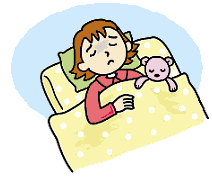いま、1型糖尿病は
2007年06月15日
23 Don't Realize Even If I Have Severe Hypoglycemia During the Night
Repeated hypoglycemia during the night

If you develop hypoglycemia as many as two or three times a week even though it may be light, there probably is something not going well with what to eat for supper or the amount of pre-dinner or bedtime insulin. In such cases, it is important to consult your doctor or other medical staff to make sure. You should tell them in detail how you were before developing hypoglycemia on that day.
The book I wrote "Childhood/adolescent Diabetes" (published by CBR) also includes some troubleshooting as to how to treat and resolve hypoglycemia. I hope you find them informative.
Nocturnal hypoglycemia after a long time
If you had severe hypoglycemia during the night after a long time, you just happened to develop it because you happened to have something different from usual on that day or night. It is not because the amount of insulin you regularly inject is too much.
The reason why I say this is that there are some patients who reduce the amount of insulin to inject from the next time reacting to hypoglycemia they just happened to develop.
Doing so will elevate blood glucose levels, actually leading to poor glucose control.
Think over why you developed hypoglycemia
If you had hypoglycemia, you should always ask yourself why. There must be some kind of reason. Oftentimes, there is something unusual which results in hypoglycemia.
As long as you can identify the cause, you are able to learn a lot from that experience. That in itself is admirable. "Failure is the mother of success."
I thought I have got used to injecting insulin fairly well….
Now I would like to look at an example of a high school student with type 1 diabetes.
He has been on insulin for more than ten years with the current HbA1c in the higher 7% range. His regimen includes injections of either regular or short-acting insulin before each meal, a small amount of short-acting insulin at snack time and Lantus at bedtime.
He adjusts his own insulin dosage (though only to the extent of adjusting by a few units), and his mother does not know anymore how he does. He actively takes part in extracurricular activities, has a keen appetite and has no specific problems.
However, he experiences hypoglycemic coma and convulsions during the night or at dawn every once in a while (about two or three times a year). When they happen is completely unpredictable. They do not happen in the night following a school athletic meet or marathon race.
Even so, there must be some reason. For example, he always injects insulin into the same spot but may have chosen a different site on that day, or he may have injected more insulin than usual because of higher blood glucose resulted from late dinner.
Be self-sufficient and one other thing to keep in mind
When patients are small, we have their mothers give them insulin injections or adjust the dosage. However, there are young patients who are old enough but still leave everything up to their mothers and adjust insulin dosage without thinking anything (about responsible insulin or algorithm). They say they are not worried about developing hypoglycemia because their parents are sleeping a few feet away and will help them in the case of hypoglycemia.
With such mindset, they will never intend to take care of themselves. It is similar to locking up the house. If you live alone, you will make sure to lock up the house. But if you live with someone else, you tend to count on that person to do it for you. You get wholly dependent on that person.
Being with someone gives you a sense of security, which is also necessary, but it is essential to have a mindset to think and deal with problems on your own even in the case of hypoglycemia because you will eventually enter the real world and have to get on your feet.
Some patients who used to live alone begin developing hypoglycemia frequently after they start going out. They have told me that they may have become off guard and think at the back of their mind that they will be fine even if they develop hypoglycemia because they have girlfriends by their side while they used to think on their own and take care of themselves.
©2007 Yasuko Uchigata
夜間にひどい低血糖になってもわからないんです

1週間に2回も3回も低血糖を起こすというなら、たとえ小さい低血糖であっても、夕食の内容とか、夕食前のインスリン量とか、寝る前のインスリン量とか、どこかうまくいかない、おかしいなというところがたぶんあるのでしょう。しっかり主治医の先生や医療スタッフと相談しましょう。低血糖になった日の、低血糖になる前の状況を、くわしくお話してください。
「どのように考えて解決していくか」というトラブルシューテングのいくつかは、拙書「小児・ヤング糖尿病-のびのびしっかりサポート」(CBR社)に書きました。参考にしてみてください。
なぜこんなことを言うかというと、たまたま低血糖をおこしただけなのに、インスリン注射量を次回から下げてしまう方がいるからです。
インスリン注射量を減らしてしまうと、血糖値が上昇してしまい、逆に血糖コントロールが悪化してしまいます。
この原因さえみつけることができれば、低血糖をおこしたけれどもそこから多くのことを勉強したということになります。とてもりっぱなことです。“失敗は成功のもと”ですね。
インスリン注射歴も10年以上で、現在のHbA1cは7%の後半、食前の速効型ないし超速効型インスリン3回注射とおやつの時に少量の超速効型インスリン、と寝る前のランタスインスリンというレジュメです。
インスリン注射量の調節(少量の単位数を動かす程度ですが)は自分でやっていて、お母さんはもうわからないといった状態。部活も積極的、食欲も旺盛で、いたって問題ない。
ところが、時に(年に2回か3回程度)夜中や明け方に、ひどい低血糖昏睡とけいれんをおこしてしまうのです。いつおこすかまったく予期できない。運動会があった夜でもないし、マラ
しかし、何かあるのです。いつも同じ場所にばかり注射しているのに、その日に限って違うところに注射したとか、夕食が遅かったので血糖が上がってしまい多めに注射したとか。
これでは、いつまでたっても自分で自分のことをやるのだ、という気持ちになりません。戸締まりと同じで、ひとりで住んでいればしっかりと戸締まりをしますが、だれかと住んでいるとやってくれるだろうという気持ちがあり、お任せしてしまいます。おんぶされた気持ち(おまかせの気持ち)になってしまいます。
安心ということも必要ですが、これから1人で社会にでていくわけで、たとえ低血糖をおこしても自分で考え、自分で処理していく心構えは絶対必要で
1人暮らしをしていた方に恋人ができて、それから頻回に低血糖をおこしてしまうようになった、という方がときどきいます。
お聞きしますと、これまでは自分で考えてしていたが彼女がいることで気持ちに弛みがでてきて、低血糖になるかもとわかっていても、彼女がいるから大丈夫とどこかで思ってしまうのかも、と話ししてくれたことがありました。
※ヘモグロビンA1c(HbA1c)等の表記は記事の公開時期の値を表示しています。
Copyright ©1996-2024 soshinsha. 掲載記事・図表の無断転用を禁じます。
治療や療養についてかかりつけの医師や医療スタッフにご相談ください。

 医療・健康情報グループ検索
医療・健康情報グループ検索